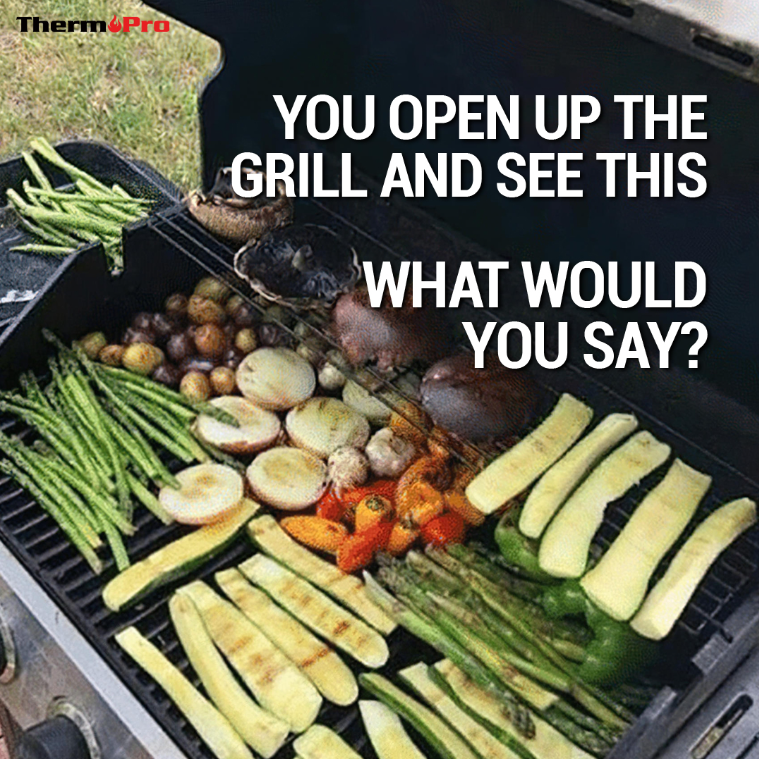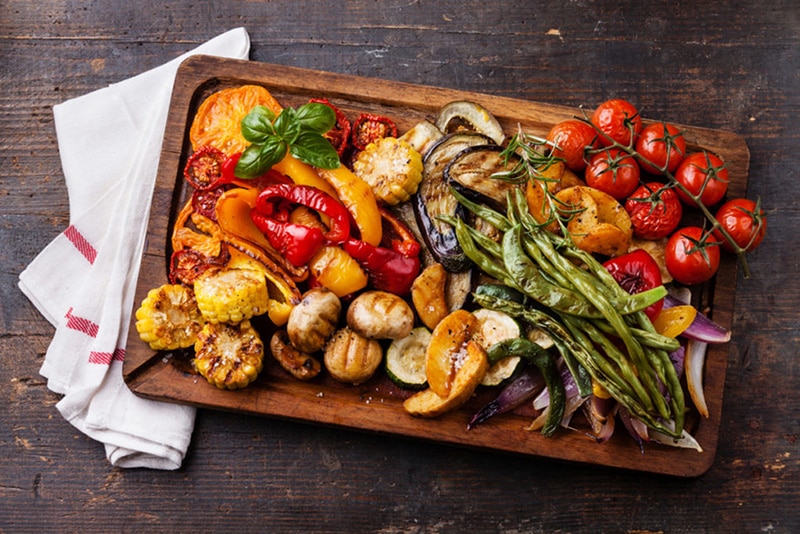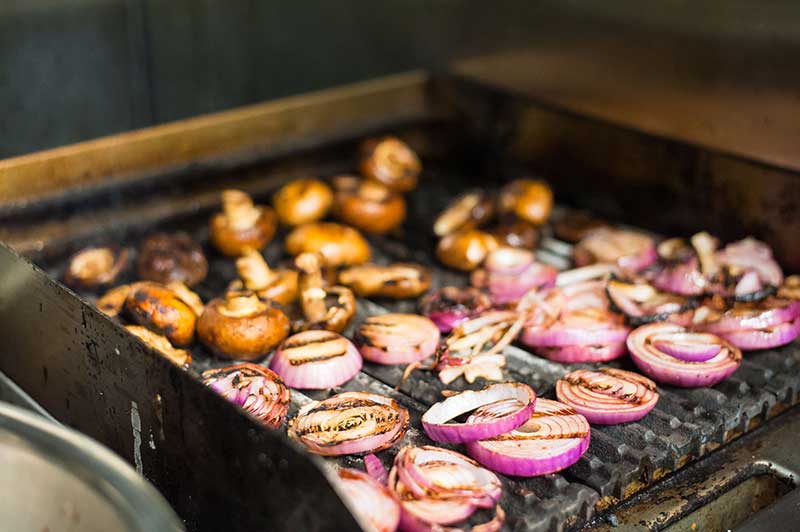The customer service team is always listening, taking notes, and quantifying complaints to ensure our products are continually improved. Due to selling directly to you, the customer, via Amazon, we can use product reviews to help us improve our existing products or help further development of new products.
Are Grilled Vegetables a Part of BBQ Culture?
Table of Contents
BBQ: Three letters that represent the pure elation that comes from eating the tastiest food known to man. We all love it without question, but its specific definition has come into doubt. That’s because the meaning of meat-oriented BBQ has become associated with non-meat activities. That begs the question: Is it correct to include grilled vegetables as a proper part of BBQ? Simply put, are BBQ vegetables actually a thing now?
As seasoned BBQ aficionados, this issue will likely rankle the brisket- and rib-consuming rank and file. A quick look at a vegetarian cookout is more than enough to convince even the faintest of heart that there is no common ground between the two. Or is there?
Before we jump to conclusions, let’s take a nuanced look at the issue of grilled vegetables. Here, we’ll ask the tough questions that will get us to the heart of this controversy.

The Problem with Grilled Vegetables
To begin by articulating the counter-argument, regular BBQ and non-meat BBQ are worlds apart. There is just about no connection between the two and everyone needs to differentiate the two from each other.
In fact, the idea of “vegetarian BBQ” is an oxymoron and ends up besmirching the great tradition of proper BBQ that goes back hundreds of years. Grilled vegetables have no place on a BBQ menu. In fact, they even have no place at a BBQ competition where their presence is routinely banned.
As we all know, BBQ is reserved for meat only. This is the ingredient that works the best over fire and smoke, changing over time to become the mouth-watering barbecue that we all know and love.
Of course, we need to say that there is in fact a place for grilled vegetables: on the side as side dishes. Let’s face it, their importance is secondary to the main course. As enjoyable as they may be between bites, grilled vegetables occupy a small place on the periphery of BBQ culture. They have no place being the center of attention of any proper BBQ cooker or grill (literally).
Therefore, as we can plainly see, BBQ culture has no place for grilled vegetables. As such, “BBQ veggies” is something that should never come up in conversation when talking about BBQ.
Defining BBQ: Where to Draw the Line
As convincing as the previous arguments are, one immediate problem with the counter-argument has to do with the definition of BBQ. That’s because if we are going to be strict about what BBQ is, we’ll need to restrict far more ingredients than just vegetables.
As a cuisine invented in the Americas, BBQ has a long and storied tradition that has split into numerous regional variations in the U.S.A. For example, the Kentucky variety of BBQ tends towards the use of mutton, whereas Texas barbecue largely favors beef in its recipes.
And yet, if we were to look at the way BBQ was first developed, we see that pork was the defining ingredient of early BBQ. That’s because the early BBQ pioneers favored pigs that were released into the wild during food shortages. As such, pork is the original ingredient that has come to define the low-and-slow nature that has come to define BBQ.
For this reason, purists would be correct to say that any kind of BBQ that doesn’t involve pork wouldn’t be “true BBQ” which is a part of its earliest traditions. So if vegetables can’t be considered a proper part of BBQ culture, then logically other types of ingredients don’t qualify as well.

The Positive Effects of Flame & Smoke
The history of cooking over a fire goes back hundreds of years for a very specific reason: because it works. Charring ingredients on a flaming BBQ creates a nice crust that retains moisture inside. And as much as some would argue that BBQ should be reserved for meat only, it remains true that BBQ has a positive effect on many ingredients—and not just meat.
As all BBQ connoisseurs already know, grilling food over a flame improves its taste. The heat transforms naturally occurring flavor precursors, thereby making them easier to detect by our taste buds. And yet, the positive effects of BBQ don’t stop there.
Unsurprisingly, BBQ is healthy for you. It can improve the nutritional value of food by causing more vitamins and minerals to leach out into food. Not only that, it allows you to cook without the use of additional fat or oil. Further to that point, BBQ cooking offers a texture advantage in addition to an esthetic one with respect to the use of grill marks.
As a result, gatekeeping BBQ to only meat ingredients is a way to limit this amazing cuisine. Opening the door to more ingredients can only help promote BBQ culture, paving the way to more BBQ grills sold and further development of this already expansive food tradition.
Meat vs. Non-Meat: Who Can Tell the Difference?
As contentious as this issue may be, a recent development threatens to upset the balance between both sides. That’s because new non-meat alternatives are routinely showing up on more grills these days. What’s more, it’s getting progressively difficult to tell just what is meat and what isn’t.
New meat alternatives like Beyond Beef and Spicy Nuggs are shaking up grocery stores with products that look and taste just like the real thing. And while these lab-grown substitutes still feature characteristics that make them stand out, we should remember that these early offerings are only expected to improve over time. In the near future, it’s not unreasonable to think that non-meat alternatives will become indistinguishable from real meat.
Not only that, it’s clear that these plant-based meat substitutes serve a purpose and won’t be disappearing from store shelves anytime soon. These products feature a completely different manufacturing process that relieves its impact on the environment. What’s more, consumers who purchase this product for ethical or health reasons can also look forward to lower prices as this technology becomes more affordable soon.
With its consumer base well-established, non-meat BBQ ingredients are something that will stay with us. Reject it or avoid it, the future of “veggie BBQ” is already here.

Final Thoughts
There are good arguments to make on both sides of this issue, making it difficult to come to a conclusion. BBQ culture is often a personal experience for many people, making this something that hits close to home.
Which side do you support? Do you think grilled vegetables are a part of BBQ culture? Let us know in the comments below!
Are you interested in making great BBQ with either meat or non-meat ingredients? Grill to perfection using a ThermoPro meat thermometer like the TempSpike Plus! Browse our full lineup at ThermoPro Store!







